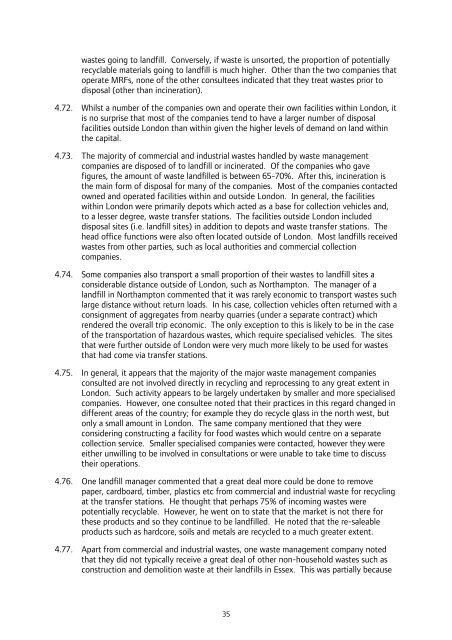London Wider Waste Strategy - London - Greater London Authority
London Wider Waste Strategy - London - Greater London Authority
London Wider Waste Strategy - London - Greater London Authority
Create successful ePaper yourself
Turn your PDF publications into a flip-book with our unique Google optimized e-Paper software.
wastes going to landfill. Conversely, if waste is unsorted, the proportion of potentially<br />
recyclable materials going to landfill is much higher. Other than the two companies that<br />
operate MRFs, none of the other consultees indicated that they treat wastes prior to<br />
disposal (other than incineration).<br />
4.72. Whilst a number of the companies own and operate their own facilities within <strong>London</strong>, it<br />
is no surprise that most of the companies tend to have a larger number of disposal<br />
facilities outside <strong>London</strong> than within given the higher levels of demand on land within<br />
the capital.<br />
4.73. The majority of commercial and industrial wastes handled by waste management<br />
companies are disposed of to landfill or incinerated. Of the companies who gave<br />
figures, the amount of waste landfilled is between 65-70%. After this, incineration is<br />
the main form of disposal for many of the companies. Most of the companies contacted<br />
owned and operated facilities within and outside <strong>London</strong>. In general, the facilities<br />
within <strong>London</strong> were primarily depots which acted as a base for collection vehicles and,<br />
to a lesser degree, waste transfer stations. The facilities outside <strong>London</strong> included<br />
disposal sites (i.e. landfill sites) in addition to depots and waste transfer stations. The<br />
head office functions were also often located outside of <strong>London</strong>. Most landfills received<br />
wastes from other parties, such as local authorities and commercial collection<br />
companies.<br />
4.74. Some companies also transport a small proportion of their wastes to landfill sites a<br />
considerable distance outside of <strong>London</strong>, such as Northampton. The manager of a<br />
landfill in Northampton commented that it was rarely economic to transport wastes such<br />
large distance without return loads. In his case, collection vehicles often returned with a<br />
consignment of aggregates from nearby quarries (under a separate contract) which<br />
rendered the overall trip economic. The only exception to this is likely to be in the case<br />
of the transportation of hazardous wastes, which require specialised vehicles. The sites<br />
that were further outside of <strong>London</strong> were very much more likely to be used for wastes<br />
that had come via transfer stations.<br />
4.75. In general, it appears that the majority of the major waste management companies<br />
consulted are not involved directly in recycling and reprocessing to any great extent in<br />
<strong>London</strong>. Such activity appears to be largely undertaken by smaller and more specialised<br />
companies. However, one consultee noted that their practices in this regard changed in<br />
different areas of the country; for example they do recycle glass in the north west, but<br />
only a small amount in <strong>London</strong>. The same company mentioned that they were<br />
considering constructing a facility for food wastes which would centre on a separate<br />
collection service. Smaller specialised companies were contacted, however they were<br />
either unwilling to be involved in consultations or were unable to take time to discuss<br />
their operations.<br />
4.76. One landfill manager commented that a great deal more could be done to remove<br />
paper, cardboard, timber, plastics etc from commercial and industrial waste for recycling<br />
at the transfer stations. He thought that perhaps 75% of incoming wastes were<br />
potentially recyclable. However, he went on to state that the market is not there for<br />
these products and so they continue to be landfilled. He noted that the re-saleable<br />
products such as hardcore, soils and metals are recycled to a much greater extent.<br />
4.77. Apart from commercial and industrial wastes, one waste management company noted<br />
that they did not typically receive a great deal of other non-household wastes such as<br />
construction and demolition waste at their landfills in Essex. This was partially because<br />
35
















